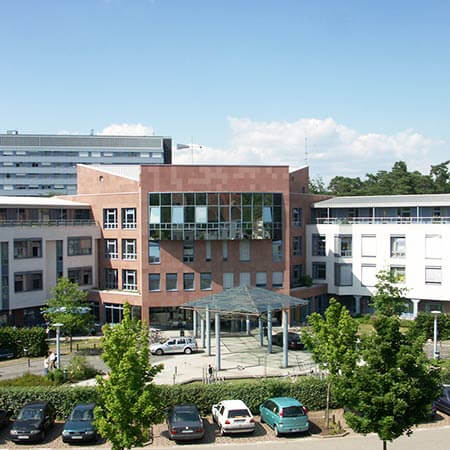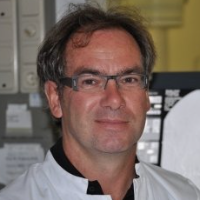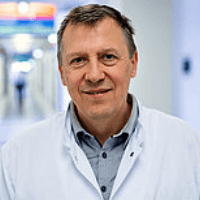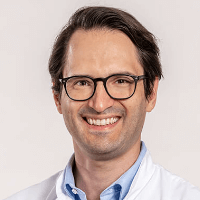Abdominal Aortic Aneurysm — Endovascular Prosthesis Bifurcation of the Abdominal Aorta: treatment in the Best Hospitals of Germany
Treatment prices are regulated by national law of the corresponding countries, but can also include additional hospital coefficients. In order to receive the individual cost calculation, please send us the request and medical records.

Department of Interventional Neuroradiology
The Department of Interventional Neuroradiology offers the full range of services in the areas of its specialization. The medical facility provides imaging diagnostics and low-traumatic image-guided interventional treatment of nervous system diseases. The department's specialists have rich experience and exceptional professional skills in the field of interventional procedures for acute and chronic vascular diseases, such as ischemic strokes, brain hemorrhages, cerebral artery stenosis, brain aneurysms, and vascular malformations. The department's neuroradiologists cooperate closely with neurologists and neurosurgeons so that each patient receives an optimal treatment regimen based on the expert opinions of the specialists. The department's medical team has state-of-the-art computed tomography (CT), magnetic resonance imaging (MRI), and MR angiography systems that are actively used for diagnosing patients and therapeutic procedures. Medical care is provided in compliance with current clinical protocols. The department also offers many outpatient medical services, which is an advantage for many patients.




Department of Diagnostic and Interventional Radiology, Nuclear Medicine
The Department of Diagnostic and Interventional Radiology, Nuclear Medicine offers the full range of diagnostic and therapeutic procedures in the areas of its specialization. The department has high-tech equipment for all types of modern imaging tests, image-guided therapeutic procedures, as well as radioisotope examinations and treatment of thyroid diseases using radioiodine therapy. The patients are provided with both inpatient and outpatient medical care. However, hospitalization is usually required only in the case of complex therapeutic interventions. The patients' health is in the good hands of the highly qualified doctors. The specialists regularly undergo advanced training courses, attend medical congresses and symposia, where they find out about innovations in the area of their specialization and share their experience with colleagues. To provide maximum safety for patients, the department strictly adheres to radiation protection standards.





Department of Interventional Radiology
The Department of Interventional Radiology offers the full range of imaging examinations, as well as innovative image-guided minimally invasive techniques for the treatment of tumors, vascular diseases and internal pathologies (for example, CT, MRI, PET-CT, SPECT). The department's doctors have deep knowledge and colossal experience in the field of interventional radiological methods of treatment, which represent an excellent alternative to open surgical interventions. Despite the high level of technical equipment and the presence of advanced computerized systems, the focus is always on the person with his individual needs. Compliance with current clinical protocols and high professionalism of the department's specialists contribute to the successful clinical practice, as well as the reputability of the department among the best medical facilities of this kind in Germany.



An abdominal aortic aneurysm is an enlargement of the lumen of a blood vessel by 50% or more of its normal diameter. Basically, the disease develops in the elderly due to atherosclerosis and degenerative changes in the vascular wall. Most patients suffer from arterial hypertension. The treatment of abdominal aortic aneurysm in Germany is carried out mainly with an endovascular technique, while open prosthetics of the abdominal aorta is not a very common treatment option.
Content
The standard method is endovascular treatment, in which doctors implant a stent graft through the blood vessels in the leg. Open surgery is quite rare.
You can seek medical attention from one of the following hospitals: Hospital Kassel, University Hospital Rechts der Isar Munich, or University Hospital Halle.
If you make your appointment at a hospital through the Booking Health service, we will take care of the arrangements for your trip. The specialists from the Booking Health company will tell you about modern treatment options, arrange a prompt appointment, help you to apply for a visa and come to the clinic, control the cost of medical services, and provide you with interpreting services.
Who may need treatment?
The presence of an aneurysm is not yet a basis for surgical treatment. Most patients have small and asymptomatic aneurysms, and the risk of their dissection or rupture is very low.
Indications for minimally invasive stenting or open surgery in adult patients are as follows:
- the diameter of the aorta in men is more than 5.5 cm in the expansion area;
- the diameter of the aneurysm in women is more than 5 cm;
- an increase in the size of the aneurysm by 1 cm or more over the past 12 months.
The treatment is also required if such complications as aortic dissection develop. This is an acute complication that requires hospitalization and immediate medical attention.
Treatment options
Endovascular prosthetics is considered the first-line treatment method in the European guidelines. It has been established that this method is no less effective than open surgery but, at the same time, it is safer and has a three times lower mortality rate. It is even less than 1% at the best medical centers in Germany.
Endovascular treatment is performed from inside the blood vessels through an incision in the leg. Doctors deliver a stent graft into the aorta and fix it inside the expanded area. As a result, the weakened aortic wall is isolated from the blood flow. Now blood is flowing inside the stent and the aneurysm is no longer progressing. The risk of aortic dissection or rupture is reduced to almost zero.
Endovascular treatment is sparing, minimally traumatic, and safe. General rehabilitation and hospital stays are minimal. Doctors in Germany can perform endovascular treatment on almost all patients, and only a few patients require open surgery.
Doctors can implant endovascular prosthesis bifurcation of the abdominal aorta through the blood vessels whenever required. It may be necessary if the aneurysm extends into the iliac arteries. Such a prosthesis consists of three parts, which are placed inside the aorta, right, and left iliac arteries.
Open surgery is less common. It is performed through an abdominal incision. The advantage of the technique is that the likelihood of a second operation for the replacement of prosthetic abdominal aorta in the future is lower than when using an endovascular technique. Open surgery is, therefore, sometimes performed on young patients.
Where is it best to undergo treatment?
You can undergo your diagnostics and treatment in Germany to expect the best results. There are medical centers specializing in treating aortic aneurysms, which have vast experience in performing operations and minimally invasive procedures for this disease. In the vast majority of cases, doctors use an endovascular procedure instead of a traumatic operation, so postoperative recovery will be easy and short.
You are welcome to visit the Booking Health website to find prices and select the best medical care program at a favorable price. Our specialists will help you to select clinics in Germany that demonstrate the best results in treating abdominal aortic aneurysms and take care of the arrangements for your trip. The cost of medical services abroad will be lower for you due to the lack of additional fees for foreign patients.
Authors:
The article was edited by medical experts, board-certified doctors Dr. Nadezhda Ivanisova and Dr. Vadim Zhiliuk. For the treatment of the conditions referred to in the article, you must consult a doctor; the information in the article is not intended for self-medication!
Sources:

